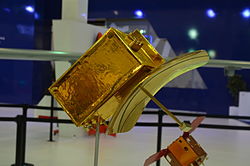History
The space program of Turkey developed as part of the Turkish Science and Technology Policy under the authority of the Scientific and Technological Research Council of Turkey in 1993, which designated space technology as one of the primary fields of technology. Prior to that, Turkey became one of the founding members of EUMETSAT as early as 1984. [3] [4] The Turkish Air Force was tasked with making recommendations on a national space agency in 2001. [5] Turkey signed a cooperation agreement with ESA in 2004. [6] In 2018, Turkish Space Agency was founded by Presidential decree. [7] The stated objectives of the Turkish Space Agency include development and resource independence through space technology. The Turkish Space Agency also seeks to develop the space program to increase Turkey's influence and recognition on the world stage. [8] Agency currently has agreements with Ukraine, Hungary and Kazakhstan's space programs, and claims to conduct extensive nation-wide assessments regarding membership to ESA since 2020. [9]
In 2021, President Recep Tayyip Erdoğan announced a 10-year plan for Turkey's space program. Other objectives include development of new space technologies, establishment of a spaceport, the formation of a Space Technology Department, and sending a Turkish citizen to space on a scientific mission. [10] As part of the Axiom Mission 3, Turkey's first astronaut Alper Gezeravcı was launched from the Florida of the United States on January 19, 2024. Gezeravcı, who spent 14 days in space, [11] performed 13 scientific experiments prepared by academic and research institutions in Turkey on the International Space Station [12] and returned to Turkey on February 12, 2024. [13] [14]
This page is based on this
Wikipedia article Text is available under the
CC BY-SA 4.0 license; additional terms may apply.
Images, videos and audio are available under their respective licenses.

